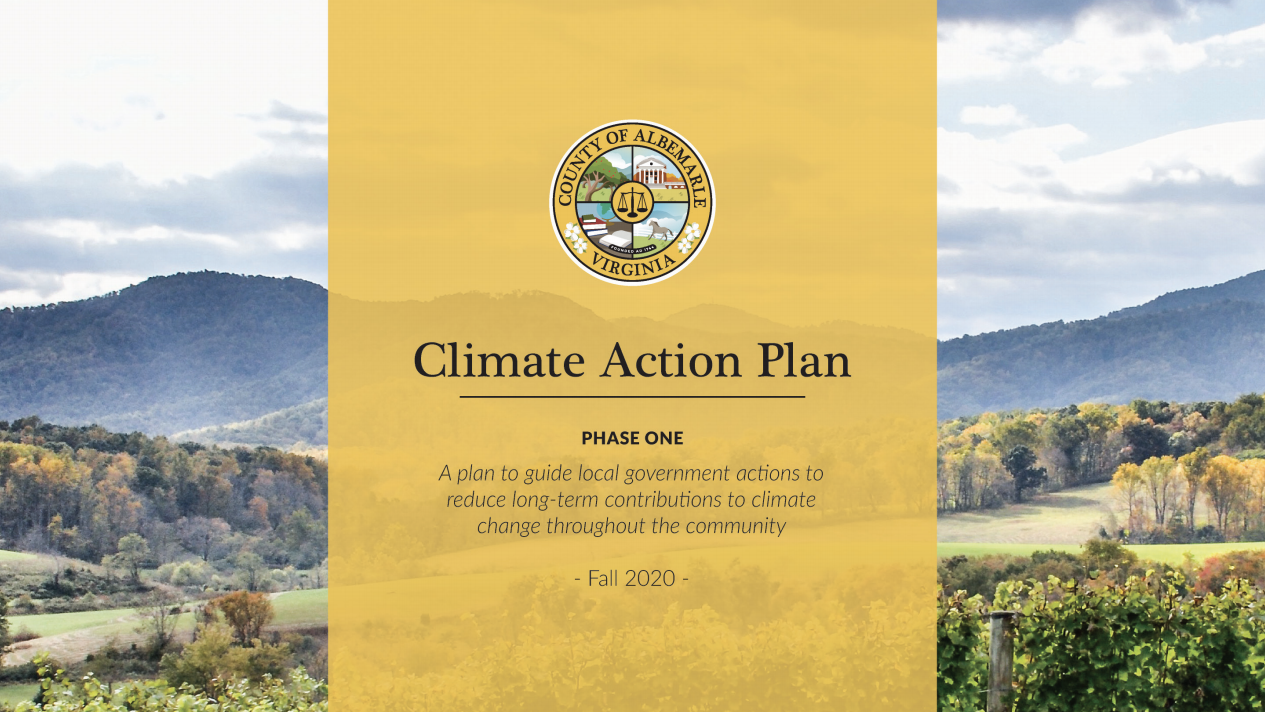
On October 7, 2020, the Albemarle County Board of Supervisors voted unanimously to approve its Phase 1 Climate Action Plan.
The Climate Action Plan recognizes and aims to meet the following targets, set last year by the Board of Supervisors, for addressing climate change in the coming decades:
- By 2030, Albemarle County aims to reduce community greenhouse gas emissions by 45% from 2008 levels.
- By 2050, Albemarle County aims to achieve zero net greenhouse gas emissions community-wide.
Prior to the vote, PEC Field Representative Rex Linville delivered the following remarks in support of the draft plan, along with a recommendation that the County immediately begin Phase II implementation and climate resilience planning as parallel efforts to its Comprehensive Plan review.
“Good afternoon, my name is Rex Linville. I live in Albemarle County and I’m speaking on behalf of The Piedmont Environmental Council and our supporting members in the region.
We would like to thank the county for the opportunity to voice our support for the Albemarle County Climate Action Plan. In our comments from June, PEC stressed the need to recognize existing greenhouse reduction strategies embedded in the County’s planning and policy documents. We also noted the importance of properly emphasizing the Climate Action Plan and its strategies within the Comprehensive Plan.
We are pleased with the improvements that have been made since that initial draft. The version before you today captures that narrative and recognizes the strong foundation Albemarle’s land use and land conservation policies have provided over the last 40+ years. These policies will accrue climate and public health benefits for our community well into the future, and swift action is needed if we are to meet the targets contained within the Climate Action Plan. What we do at the local level matters, and while we will likely need to implement all the actions laid out in the Plan and more, PEC highlights the following two focus areas:
- Albemarle County is one of the most highly protected counties in the Commonwealth, with over 107,000 acres that are permanently protected with conservation easements. Transportation is recognized as the single largest contributor to greenhouse gas emissions and these protected rural landscapes significantly reduce sprawl and related vehicle miles traveled. They also keep this land available for carbon sequestering agriculture and forestry practices, protect the Rivanna River watershed, and provide our region with a resilient local drinking water supply. We hope you will look seriously at action T.2.5 and continue to provide incentives for and investment in the protection of our Rural Area as a key Climate Action strategy.
- The first four “immediately actionable” recommendations within the Transportation and Land Use section of the plan focus on increasing opportunities for bicycling, walking, and other forms of personal transportation. The Piedmont Environmental Council has enjoyed a positive and productive relationship with Albemarle County, the City of Charlottesville, UVA, and the TJPDC to encourage investment in this necessary urban infrastructure. This investment will not only serve the Climate Action Plan goals, but has the co-benefits of fostering economic development, improving health of residents, and increasing quality of life.
Finally, we recommend that the county immediately begin Phase II implementation and climate resilience planning as parallel efforts to the Comprehensive Plan review. The urgency of our climate crisis demands that we move swiftly and set clear timelines, specific targets, and interim benchmarks. We live in a community that recognizes the severity of the problem and is committed to working with you on solutions.
PEC along with numerous other environmental, conservation, and climate focused organizations are here to help with the implementation necessary to meet these goals set in this Climate Action Plan. You are not in this alone! We look forward to participating in the process and will continue our related efforts in land conservation, promoting smart growth, and advocating for innovative transportation solutions.”
